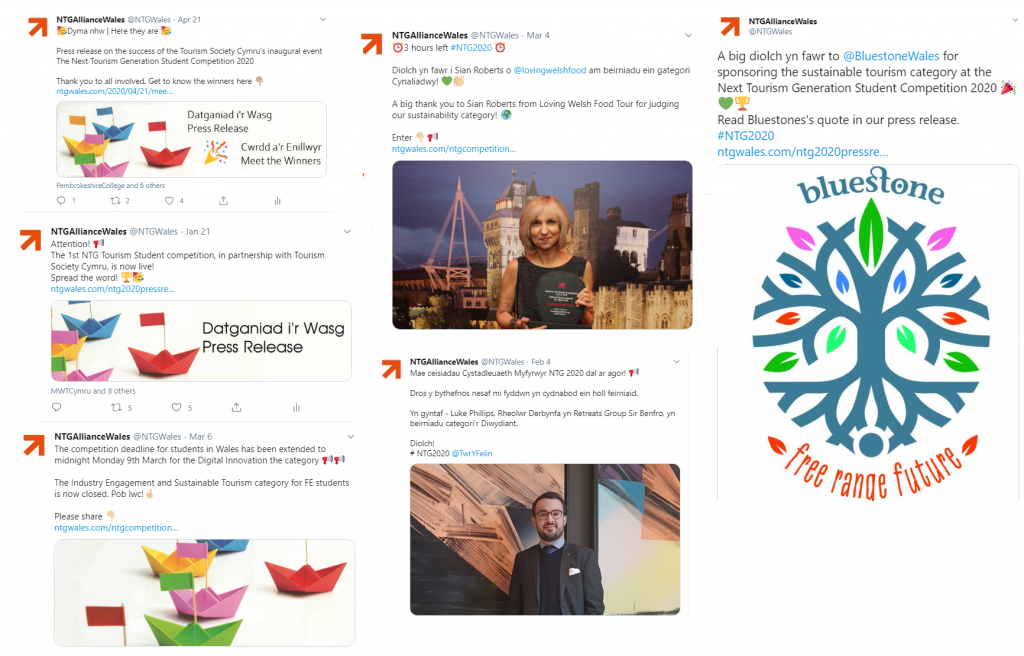How to Deliver a Tourism Skills Competition for Students: Lessons from Wales
The Tourism Society Cymru in partnership with the Next Tourism Generation (NTG) Project partner, Cardiff Met, came together to plan and create a Tourism Skills Competition for students. Calls went out inviting students from colleges and universities across Wales to pitch their best experiences of industry engagement, digital innovation and sustainable tourism. The aim of the competition was to help deliver NTG goals which are to enhance:
- collaboration between industry and education
- integration of digital and sustainability skills in education
- promotion of careers in tourism and hospitality
Competition judges as well as higher education (HE) and further education (FE) were asked for their feedback once the competition had finished. The NTG Wales team also came together to reflect on the process. This blog presents a bite sized lessons learnt and best practices of the journey.
Preparation of Competition Guidelines, Marking Scheme and Entry Criteria
Once the competition was agreed with Tourism Society Cymru in line with mutual objectives, the next point of call was to develop award categories, entry guidelines, marking criteria and entry forms. As this was an inaugural event, these tasks were time intensive. Inspiration for building these competition foundations were drawn from UK competitions (ABTA and Institute of Hospitality) and a Cardiff Met “Living CV” video module. All documents were provided online for students to enter.
The competition encouraged students to enter through the medium of Welsh or English. This was the first ever tourism student competition in the UK that enabled participants to enter in Welsh. The promotion of Welsh is crucial culturally for future generations in Wales.
Student entries for the competition required a short video (maximum 3 minutes) and a written submission (maximum 500 words) about their skills, knowledge and innovativeness in the chosen category. Interestingly, judges enjoyed assessing the videos, whereas FE and HE were not so enthusiastic.
“I found the experience very rewarding to see young people showing such clarity in what they hope to achieve.” – Jonathan Jones, Tourism Society Cymru
“The video probably needs to be more about supporting the application – Video is what put students off!” – University lecturer
Competition Timeline
All important dates and deadlines were set before the competition launched. The competition opened in January and was due to close in March 2020. The deadline for entries was extended for a fortnight to maximise digital innovation entries, although none were received.
On reflection it is crucial to consult many educational providers on when is the most optimum time to hold the competition. It is important to note that the best time window may vary between different providers. A lesson learnt in Wales is that a longer and earlier competition window (mid-September to mid-January) would suit both HE and FE illustrated in the quotes below.
“Start of academic year through until mid-November when students have more time.” – University lecturer
“Just after October half term… timing of the application process was ideal.” Sharon Jones, Programme Leader Travel and Tourism at Coleg Menai
Maximising Stakeholder Engagement
To boost stakeholder engagement in the competition, industry professionals were invited to volunteer their time to judge competition entries. It was challenging to know how many judges to appoint in each award category as the number of competition entries could not be estimated!
Thirty judges were appointed including experts from digital marketing, sustainable tourism and other industry sectors – several were native Welsh speakers. Feedback from judges post-competition was positive. For example, judges were honoured to be asked and the judging criteria was considered easy to interpret. Most judges marked 3 entries but they agreed that 5-10 entries would be reasonable to mark in a week.
To further enhance stakeholder engagement, the #NTG2020 Student Competition sought sponsorship from tourism and hospitality companies. Bluestone Resort in Pembrokeshire, well-known for its sustainability programme, was the sponsor of the prizes. Bluestone donated £100 Amazon voucher to each winner. This sponsorship heightened the profile of the competition on social media and the prizes made the competition more attractive to enter.
A high-profile awards ceremony for students and stakeholders was planned to reward everyone and increase networking between industry and education. Due to COVID-19, regrettably the celebration has been postponed. The ceremony was also going to fundraise for the Family Holiday Association. Industry sponsors donated raffle prizes to help with their work here in Wales – because a little bit of sunshine goes a long way for a struggling family.
Promoting the Competition on Social Media
The twitter campaign promoted the competition throughout the application process, introduced the judges and announced winners. The campaign had over 700 retweets and likes on Twitter and was also promoted on LinkedIn.
Pre and post competition press releases were created, translated into Welsh and disseminated via the media. The competition winners featured in a Welsh and a UK online newspaper. However, post competition feedback recommended that more could be done to maximise engagement and promotion online.
Maximising Student Participation
Every effort was made to contact universities and colleges delivering courses related to tourism and hospitality to promote the competition. This process was via email; followed up by phone, the posting of colourful bilingual posters to course representatives and a briefing PowerPoint for students. As an inaugural competition, this was a time-consuming process to identify relevant educational providers and key contacts.
Every student who entered the competition was sent feedback from their judges. Comments were in depth and encouraging and aimed to inspire continued enthusiasm for their careers in tourism. This expert guidance was received well by educators:
“Very useful feedback, both positive and constructive.” – Sharon Jones, Programme Leader Travel and Tourism at Coleg Menai
The competition successfully awarded four students with certificates. Budding chef, Evan Davies, won the Industry Engagement award and Jenna O’Brien won the Sustainable Tourism award for her inspiring enthusiasm. Lauren Boyce of University of Wales Trinity Saint David and Amy May Evans from Gower College were both Highly Commended for their excellent applications.
Recommendations for Future Competitions
- Tourism student competition is a great way to encourage collaboration between industry and education, to highlight best practices in the delivery of digital and sustainability skills and promote careers in tourism and hospitality.
- Consulting educational providers in the design of the competition is important.
- Achieving partnerships and/or sponsors and appointing industry judges maximises stakeholder engagement.
- Competitions can be delivered with a minimal budget but it is important to consider administrative demands.
- Consider a longer competition window and more promotion on social media to maximise student participation.
- Award ceremonies are popular and could be combined with a national and/or international tourism event e.g. Wales Tourism Week or UNWTO World Tourism Day.
- Plan to sustain the competition in the longer-term post-project timeline if applicable.
- Don’t try and re-invent the wheel, draw on existing competitions and educational resources!
Wales hopes to hold an NTG 2021 but this is challenged by the current crisis. #NTG2020 was welcomed and future competitions would continue to provide a platform to showcase best practices and the future generation of the Welsh tourism industry.
Follow the efforts of the Next Tourism Generation via our website, Facebook, Twitter | #NTGskillsalliance or via LinkedIn






No Comments